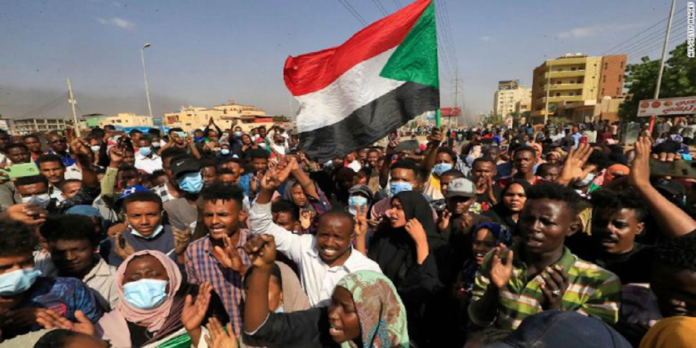KHARTOUM: Lashing, frisking, and arbitrary detentions – Sudanese protesters say security forces have resorted to frenzied violence to quash street protests against the country’s latest military coup.
Since the power grab on Monday, security forces have heavily deployed on the streets of the capital Khartoum and beyond.
Some protesters drew grim parallels with life under autocrat Omar al-Bashir, whose three decades in power only came to an end in April 2019, when the military was pushed into deposing him by enormous street protests against his iron-fisted rule.
“All security on the streets now look like the Bashir-era forces,” said one protester, Hanaa Hassan.
Protests were dispersed by tear gas and live bullets left at last four people dead, according to an independent doctors’ union.
On Wednesday, military forces also stormed the building of the official news agency SUNA and forced out all reporters, according to journalists, who requested anonymity for fear of reprisals.
Students have been among those drawing the attention of security forces.
On Monday evening, forces seeking to prevent gatherings stormed student accommodation at the University of Khartoum.
“Our dorms were stormed by armed men in military fatigues, who gathered us in the common rooms and confiscated our phones,” female student Reyan told AFP, declining to give her last name for fear of reprisal.
“They beat some of us with whips and asked us to immediately leave the dorms.”
Plainclothes police have set up random checkpoints on the main streets of the capital, as pick-up trucks carrying armed men with covered faces roamed the streets.
Cars were stopped for random searches, passers-by frisked, and their phones and identities checked, according to witnesses.
Top General Abdel Fattah al-Burhan, Sudan’s de facto head of state since 2019, on Monday declared a nationwide state of emergency, dissolved the government, and detained ministers and civilian members of the ruling body and cabinet.
Prime Minister Abdalla Hamdok was detained before he was escorted home – albeit allegedly ringed by a security cordon around his house – late Tuesday following intense international pressure for his release.
‘Beat us with whips’
Another student, Emad, who lived in the male university dorms, said his head was forcibly shaved.
“They also beat many of us with whips,” he added.
Online videos have shown students reporting the attack, with the voices of others screaming in the background.
“A military man hit me with all his force on my hands and on my head,” a female student said in a video, with blood streaming down her face.
AFP could not independently verify the authenticity of the video.
On Wednesday, street barricades set up by protesters were dismantled.
Security forced passers-by to assist in tearing down the roadblocks and those who refused were beaten with whips, according to an AFP correspondent.
The crackdown swept up several pro-democracy activists, including Sedeeq al-Sadiq al-Mahdi from Sudan’s largest political party, the Umma Party.
The arrests also included lawyer Ismail al-Taj of the Sudanese Professionals Association, an umbrella of unions that was instrumental in the protests against Bashir.
The association called for “million strong protests” on October 30, stating that “vengeful” violence has surged particularly strongly since Hamdok was allowed home.
Monday’s coup came amid a rocky transition outlined in a 2019 power-sharing deal between Sudan’s generals who ousted Bashir, and civilian figures who spearheaded protests against his rule.
Ahead of the coup, rival protests took to the streets, with one demanding a return to military rule. But tens of thousands responded with demonstrations demanding full civilian rule.
Analysts have said the coup was far from surprising and was expected to be met by heavy civilian resistance.
